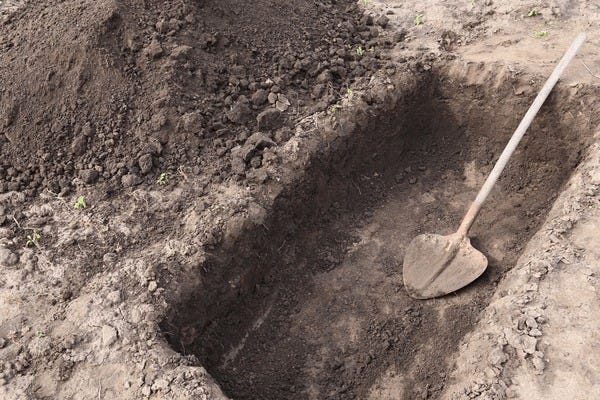Grief Is a Skill
To make a new world, we must learn to adequately mourn our current one.
This is Part One of a two-part series on grief.
Several months ago, a family member passed away. The funeral was held at a suburban funeral home. My uncle, a rabbi, led a very nice service. And then we traveled by car to the graveyard, where more prayers were recited. And, as that happened, I mentally prepared myself for something I’ve done several times before but never ever feel quite right about doing—which, it turns out, is the point.
In Jewish tradition, each member of the deceased’s family takes turns shoveling dirt atop the loved one’s coffin. You stand in a line in silence as others go, hearing the thud, thud, thud before you, until it’s your turn. And then you take the shovel, and you grab as much dirt as you can with its backside—signifying your reluctance to take part in this burial, and you throw it six feet below onto the pine box. And then you do the next two shovelfuls with the correct side of the shovel, grabbing much more dirt than the first time and again throwing it down—signifying your acceptance that this person is, indeed, dead; but also, and more crucially, that you are taking an active role in their burial; taking an active role in their transition into the dirt that surrounds them (Jews are only allowed simple coffins without varnish so that our bodies can become one with the earth and give way to new life relatively quickly); taking an active role in their death.
This ritual has changed how I’ve thought about the mental states that almost always accompany death and loss—what we call grief. It is so often thought of as a passive process: you lose something or someone and your psyche is injured and then it must recuperate until it is healed.
But standing there, watching my mom and my brother and my dad participate in this burial, I began to realize that grief requires collaboration with the dead—that it is not only a matter of waiting to feel better and move on, but a matter of purposefully and willfully furthering whatever loss you happen to be dealing with. To get better, you must grieve, and to grieve, you must engage in the destruction of the psychic ties that bind you to what has been lost.


